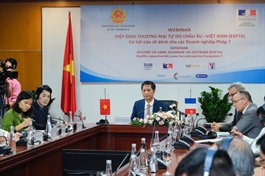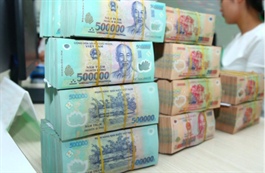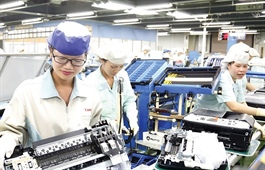European enterprises cheer on Vietnam’s EVFTA preparations
European enterprises cheer on Vietnam’s EVFTA preparations
EU businesses are raring to embrace Vietnam’s positive administrative changes involving healthcare, tax, customs, and other legal matters to unlock the full potential of the landmark EU-Vietnam Free Trade Agreement.

With the EVFTA finally coming into force this year, local businesses and citizens can reap multiple benefits. Photo: Le Toan
|
At last week’s Whitebook 2020 launch and dialogue of the prime minister’s Advisory Council for Administrative Procedure Reforms with the European business community, Mai Tien Dung, Minister, Chairman of the Government Office, said that the government has cut 239 conditional business lines, thus increasing the total number of cuts to nearly 4,000 since the start of 2016, with 6,776 types of goods exempt from specialised inspections.
“The government will continue to reduce and simplify regulations related to business activities in the 2020-2025 period,” he noted. “The implementation of the EU-Vietnam Free Trade Agreement (EVFTA) will help create a long-term and stable framework to fully tap into the co-operation potential, thus increasing bilateral trade and investment to new heights.”
Reforms promise benefits
To successfully implement the EVFTA and to create more favourable conditions for foreign investors, government agencies are making strong and bold administrative reforms ahead of the historical deal. Pharmacy and healthcare, goods labelling requirements, tax tariffs applied to functional foods, intellectual property, and e-commerce, among others, are expected to witness a raft of new improvements.
Specifically, the Ministry of Agriculture and Rural Development (MARD) issued Decree No.13/2020/ND-CP, which took effect in March, guiding the Law on Livestock Production to help clarify administrative procedures in livestock breeding, reduction and easing of quality inspection of imported livestock products, and cutting of unnecessary conditions on livestock breeding and more.
Regarding EU concerns over the use of antibiotics in livestock and aquaculture, MARD Deputy Minister Nguyen Hoang Hiep said that the ministry is working on a roadmap for this by 2025 as seen in Decree 13.
“The MARD also bans the usage of 2,000 kinds of pesticides now, while increasing the production of organic pesticides to three million tonnes by 2025, making up 30 per cent of the total amount of plant protection products compared to the current two million tonnes, accounting for 20 per cent of the total,” Hiep elaborated.
In pharmacy and healthcare, the General Department of Taxation under the Ministry of Finance (MoF) is revising Circular No.26/2015/TT-BTC dated 2015 providing guidance on VAT towards making it more consistent with Decree No.169/2018/ND-CP from 2018 on the management of medical devices to enable medical device importers to enjoy a VAT of 5 per cent. The Ministry of Science and Technology (MoST) said that the country now has regulations on intellectual property, including those on imposing punishments on violations. For instance, inter-ministerial Circular No.14/2016/TTLT-BTTTT-BKHCN on procedures for change and revocation of domain names violating the Law on Intellectual Property.
“In the upcoming time, when the Law on Intellectual Property is revised, a focus will be on punishment on intellectual property violations on the internet,” said the MoST representative.
Meanwhile, the Ministry of Information and Communications will promote digital signatures in line with the EVFTA.
As expected by members of the European Chamber of Commerce in Vietnam (EuroCham), as shown in Resolution No.68/NQ-CP dated May 12 on reducing and simplifying regulations on business activities during 2020-2025, the government will cut or simplify at least 20 per cent of the current regulations on business over the next five years.
The government will also slash at least 20 per cent of business procedure compliance costs as currently regulated, while minimising the number of legal documents about business operations.
Legal improvements in innovative pharmaceuticals, medical device machine installation in hospitals, goods labelling requirements, tax tariffs applied to functional foods, and e-commerce were among the most sought-after as those areas expect to blossom when the EVFTA takes effect on the back of a predictable and favourable consistent legal environment for investment.
Towards successful enforcement
According to EuroCham, with the EVFTA entering into force, it is essential that business and government work together to ensure smooth and successful implementation.
EuroCham’s Healthcare Forum has proposed legal changes in life sciences towards including incentives, establishing an inter-ministerial task force to develop a holistic approach for sector development, and enabling public-private partnerships.
Meanwhile, EuroCham Pharma Group, which represents the voice of 22 multinationals such as GlaxoSmithKline, Hoffman-La Roche, Johnson & Johnson, Pfizer, and Novartis Vietnam, has also sought more facilitation in drug registration, government procurement, and enablers for further investment.
In wines and spirits, EuroCham members recommended the government and the MoF promulgate special preferential tariffs according to the committed scheduled under the EVFTA. This tariff schedule should be effective as soon as the two sides complete the approval process.
“Although there may be a delay in the issuance of this document, the Vietnamese government must create all conditions and ensure the rights of enterprises to benefit from agreed concessional tariffs according to the schedule committed by the agreement,” one EuroCham member said.
In regards to the hot issue of special consumption tax (SCT), EuroCham members suggested the MoF consults with the government to maintain the predictability and stability of the current SCT system in order to facilitate the operation of foreign businesses in Vietnam, and the European business community in particular.
Other issues under discussion include taxation-supporting policies for automobiles and electric vehicles, trans-shipment limitation of foreign-invested automotive companies, a ban on motorcycle circulation in big cities by 2030, management of imported materials for export production, proposed excise tax on sugary drinks, harmonising an international law on goods labelling, and customs clearance.

























